6 Adaptogens that Support Hormone Balance

- My recent health challenges and my interest in using adaptogens
- What are adaptogens
- Ashwaghanda
- Maca
- Reishi mushroom
- Rhodiola rosea
- Schisandra
- Siberian ginseng
- References and resources
 Over the past couple of years, I’ve had some major hormone fluctuations. This was partly due to the mold exposure that disrupted my hormones (among other things!), and the coinciding timeline with the onset of perimenopause.
Over the past couple of years, I’ve had some major hormone fluctuations. This was partly due to the mold exposure that disrupted my hormones (among other things!), and the coinciding timeline with the onset of perimenopause.
As I was healing from the mold exposure, my doctor had suggested some custom bioidentical hormone replacement therapy (HRT).We were testing my hormone levels every 1-2 months to adjust the dosages and see the response.
I believe this was helpful for me for a period of time, but as I began to heal from the mold and realized I was in peri menopause, I became very interested in the science around herbs and adaptogens, and with the combined support and encouragement from my doctor, my own research, as well as the research and work of Dr. Stacy Sims (who has a complete course about adaptogens in her premium membership), I felt confident in my transition.
In this brief overview, I will cover some things I have tried myself in the hope that it inspires you to further research and conversations with your own doctor. This is by no means a comprehensive list of all the available compounds out there, and I highly recommend you do your own further research and have data about your hormone status as each of us has a unique health history and genetic blueprint, and is in her own life stage.
Adaptogens
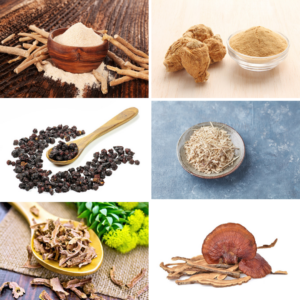 Adaptogens are medicinal plants (1) that can enhance the body’s natural resistance to stress and increase the rates of oxygen, protein, fat and sugar utilization. They function by affecting the HPA axis (hypothalamic–pituitary–adrenal) – which is how your brain talks to your hormones – and the immune-neuro-endocrine system (2).
Adaptogens are medicinal plants (1) that can enhance the body’s natural resistance to stress and increase the rates of oxygen, protein, fat and sugar utilization. They function by affecting the HPA axis (hypothalamic–pituitary–adrenal) – which is how your brain talks to your hormones – and the immune-neuro-endocrine system (2).
Their usefulness may be improved with concurrent dietary and lifestyle strategies like an anti-inflammatory diet, whole foods, stress management techniques like meditation, good sleep hygiene, and regular exercise.
That’s your 4 pillars of health in a nutshell – because doing everything we can ourselves to create an optimal state within the body can only bolster the impact of helpful compounds we’re using that are trying to work within us.
We want to imagine “how can I create the best possible conditions for these guys to do their job?”
Adaptogens have many well-studied benefits for hormone balancing.
Uses may include and benefit those looking for relief from a host of symptoms from: depression, anxiety and mood related issues, sleep difficulties, brain fog, focus and cognitive decline, hormone balancing and the hot flashes and night sweats associated with estrogen dominance in peri and post menopause, the reduction of the stress response and the associated body composition impact cortisol has on increasing body fat and reducing lean mass, to cellular energy production and more.
The key in adaptogens is the way they help us adapt to stressors.
 I like the way the adaptogens actually help the body to adapt to stressors they’re presented with rather than giving “commands” like a drug does (and to be clear, I have been grateful for the option to use different drugs when I needed them). They have a synergistic effect, harmonizing with your body the way a good DJ harmonizes two different pieces of music together.
I like the way the adaptogens actually help the body to adapt to stressors they’re presented with rather than giving “commands” like a drug does (and to be clear, I have been grateful for the option to use different drugs when I needed them). They have a synergistic effect, harmonizing with your body the way a good DJ harmonizes two different pieces of music together.
To me, adaptogens are exciting because they seem to open up more options for women going through life stage transitions, and it’s a type of intervention we can learn about ourselves and then determine the right course forward with help from a great practitioner (here’s the Institute for Functional Medicine’s practitioner directory finder).
I do think it’s essential to have hard data about the status of your hormone health, and we need tests to know what’s going on inside as we’re making decisions about what to use.
Plant compounds are powerful, and we want to choose them intentionally. So having that data on where your hormone levels are at is imperative, and it’s what has informed my use personally. Here’s the short list of some I’ve researched and used myself and I hope it is useful.
Ashwaghanda
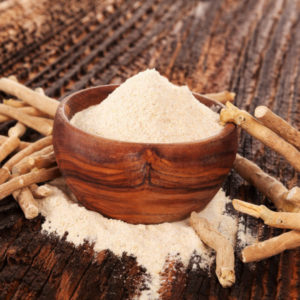 An important herb in Ayurvedic medicine, Ashwaghanda is readily available in powder or pill form. I’ve used it both ways, but tend to prefer it in capsule form just because it’s an easy part of my routine.
An important herb in Ayurvedic medicine, Ashwaghanda is readily available in powder or pill form. I’ve used it both ways, but tend to prefer it in capsule form just because it’s an easy part of my routine.
Brain benefit: Ashwaghanda can improve the memory, and decrease brain fog. It helps modulate neurotransmitters (the body’s chemical messengers), specifically affects seratonin and dopamine.
Immune benefit: Ashwaghanda improves the body’s defense against disease by improving cell-mediated immunity. It has strong anti-oxidant properties that help protect against cellular damage caused by free radicals.
It also acts like an anti-inlammatory by inhibiting the COX-2 prostaglandins (working like aspirin to reduce the inflammatory response) which can reduce our clotting factors – so if you’re on blood thinners you should not use it.
Hormone benefit: Ashwaghanda enhances the body’s resilience to stress by decreasing the baseline cortisol response – reducing anxiety and fatigue (4, 5). With its ability to lower the sympathetic response, it can help reduce that tired and wired feeling, which can promote better sleep.
It also supports thyroid stimulating hormone (TSH) and increases T3 and T4 (so it’s contraindicated if you’re on thyroid medication or have any thyroid issues). It reduces cortisol and moderates estradiol (E2) – as in it helps bring it into balance. Keep in mind that E2 is the estrogen that we have during our menstruating years, and it’s the estrogen responsible for our ability to build muscle in the follicular phase (first half) of our cycle. So keeping it balanced is essential for body composition benefits.
It can also improve the vasomotor symptoms associated with peri menopause (hot flashes and night sweats).
There is also some really cool research regarding the impact it has on delayed onset muscle soreness and strength gains through its action as an anti inflammatory. With the the reduction in the stress response (and resulting lowered cortisol) you aren’t subject to signaling for increased visceral fat storage. Combined with its ability to help with blood glucose control there is a significant impact on body composition, namely reduced body fat and ability to build lean mass (3).
- Look for: greater than 3% withanolides
- Take it: morning or night
- Contraindicated: thryoid medication or blood thinners
Maca
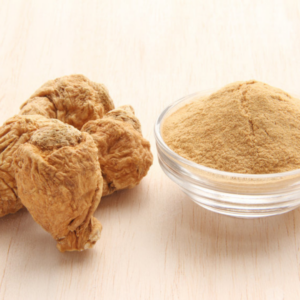 Maca is such a cool adaptogen with many well-documented benefits for hormone balancing, and can mitigate some of the early post-menopause symptoms, as well as be supportive to hormone balancing at other stages of the life cycle.
Maca is such a cool adaptogen with many well-documented benefits for hormone balancing, and can mitigate some of the early post-menopause symptoms, as well as be supportive to hormone balancing at other stages of the life cycle.
I’ve been using it in the capsule form (just because it’s easy with my routine) but it’s also effective and readily available in the powder form – you could put it in a smoothie.
Hormone benefit: One of its key benefits is its ability to moderate estrogen metabolism. This becomes important for many women as they enter peri menopause and experience estrogen dominance.
At any point in your life cycle you could experience estrogen dominance or estrogen fluctuation, and maca has a good track record for helping to balance estrogen levels. Due to its impact on estrogen, it has the ability to modulate lean mass to fat gain, as estrogen dominance can leave us more prone to fat storage and unable to build muscle – and it’s been shown to improve bone density markers.
It helps reduce symptoms like hot flashes and night sweats, improves mood, concentration, and focus, and reduces anxiety, nervousness, interrupted sleep patterns, fatigue, stress, headaches, depression symptoms, and improves libido in early post-menopausal women. That’s kind of amazing!
It’s also been shown to increase iron, and reduce T3 (thyroid hormone) so it may be contraindicated if you’re on thyroid medication. Always best to be aware and talk to your doctor.
During clinical studies, it was determined that there is a progression in the reduction of the menopausal symptoms women experienced between the 1-2 month mark of taking it regularly and continuously (6). The impact wasn’t immediately apparent. So this is one of the cool features about many adaptogens – they slowly build up their efficacy in your body, almost “talking” to your cells and chemical messengers and helping to modulate certain responses.
- Look for: Red Peruvian maca root variety (glucosinolate content)
- Take it: Stimulatory, so best taken early in the day.
- Contraindicated: if you’re on thyroid medication
Reishi mushroom
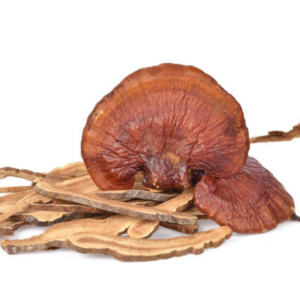 The Reishi mushroom (ganoderma lucidum) has long been used to promote health and longevity in many Asian countries (7). It can be found in powder or capsule form, and also in teas or tinctures. I’m currently taking another compound (prescribed by my doctor) that has Reishi in it along with other herbs so that’s my current form of ingestion.
The Reishi mushroom (ganoderma lucidum) has long been used to promote health and longevity in many Asian countries (7). It can be found in powder or capsule form, and also in teas or tinctures. I’m currently taking another compound (prescribed by my doctor) that has Reishi in it along with other herbs so that’s my current form of ingestion.
Immune benefit: A lot of the research around this compound is in the field of oncology, as it shows immune supportive benefits. It boosts the immune response by increasing how the natural killer cells work against invading pathogenic bacteria and virus, and guards cells against antioxidant damage (8,9,10).
Brain benefit: It also has an impact on the central nervous system and exhibits anti-fatigue properties. It can increase concentration and focus, and with its effect on the neurotransmitters (dopamine and seratonin) it can help reduce anxiety (11).
Hormone benefit: Due to its ability to act as an estrogen modulator, it may give you a better effect from your body’s natural estrogen. So it has the potential to enhance your body’s natural estrogen effect, as well as the response your body has to it (12,13,14).
For peri and post menopausal women with low or fluctuating estrogen, this may be beneficial in helping to reduce some of the associated symptoms that come along with this time of hormone fluctuation, like the hot flashes and body temperature regulation.
- Look for: Dried powder with 20% beta glucan inclusion
- Take it: accounts differ for long term use, but Dr. Sims suggests a 12 week cycle with a 4 week break in between the next cycle.
- Contraindicated: Use can increase the risk of bleeding, so if you’re on anticoagulants it is contraindicated; contraindicated for those on blood pressure medication
Of additional interest in the mushroom category is cordyceps, which is a fungus that grows on the caterpillar of a moth. Its active components are adenosine and cordycepin, and it’s well known in the endurance training space for its ability to increase aerobic capacity. It impacts vasodilation and increases blood flow to the muscles while also increasing ATP levels.
It benefits the immune system and it can improve mood, focus, and decrease anxiety, and works as an antidepressant due to its adenosine concentration. It behaves in a similar way to a steroid hormone due to its similar molecular structure, and increases estrogen, progesterone and testosterone production.
My concern with this adaptogen and why I don’t personally use it anymore is the highly unsustainable manner in which it is being harvested. I bring this up as a point for consideration when sourcing your herbs and botanical compounds. If you are interested in sustainability in the herb market, check out the resources on the Sustainable Herbs Program from the American Botanical Council.
Rhodiola rosea
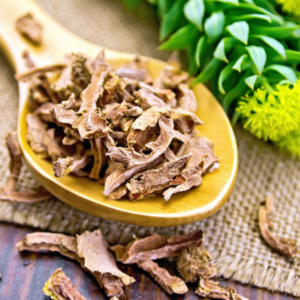 Rhodiola rosea is an herb that grows in cold regions of Europe and Asia, the roots of which are adaptogenic. You can find it as a capsule, powder or tincture. I’ve been taking it as a capsule.
Rhodiola rosea is an herb that grows in cold regions of Europe and Asia, the roots of which are adaptogenic. You can find it as a capsule, powder or tincture. I’ve been taking it as a capsule.
Immune benefit: With its high polyphenol content (polyphenols combat oxidative stress and free radical damage) and its some 140 bioactive compounds (including salidroside and rosavins), Rhodiola has anti-inflammatory, immune boosting and neuroprotective benefits. It has shown to protect the mitochondria from damage and increases ATP synthesis (16).
Hormone benefit: Many studies have shown that it plays a role in improving the stress response, mitigating chronic stress, and supporting better sleep (15).
Due to its ability to affect the neurotransmitters (seratonin, dopamine and norepinephrine) helping to keep them from being degraded, it helps to decrease symptoms like anxiety and depression while enhancing relaxation which allows the brain to focus and work better (18).
When it comes to balancing the sex hormones, rhodiola acts as a selective estrogen reuptake modulator (SERM) (17). As estradiol (an important form of estrogen) declines as we approach menopause, rhodiola can modulate the receptor site which means that if you have too much estrogen it can exert a moderating effect, and if you have too little, it can act as a booster.
In turn, it reduces the impact of estrogen fluctuation and also supports heightened inflammation and vasomotor symptoms (hot flashes, night sweats) that come along with peri menopause and early post menopause. Since mood swings, anxiety and depression are also hallmarks of this transitional life stage, rhodiola’s beneficial impact on the brain and neurotransmitters can improve these symptoms (19, 20).
- Look for: Standardized rhodiola root extract (0.8-1% salidroside, 3% rosavins)
- Take it: in the morning and/or afternoon (due to its stimulating affect), but not at night
Schisandra
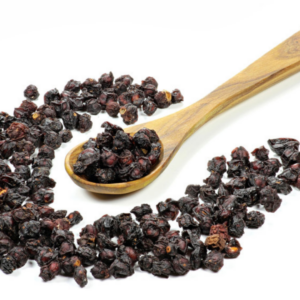 Schisandra chinensis (which means 5-flavor fruit) is a plant with berries described to have 5 flavors. In traditional Chinese medicine, Schisandra is considered beneficial to the life force energy, or qi.
Schisandra chinensis (which means 5-flavor fruit) is a plant with berries described to have 5 flavors. In traditional Chinese medicine, Schisandra is considered beneficial to the life force energy, or qi.
The dried berries are usually consumed in an extracted powder, capsule or tincture form. I’ve been taking a capsule. Due to their stimulating affect, taking them in the morning or early part of the day is advised.
Brain benefit: It stimulates the central nervous system, boosts your brain energy, and promotes better focus.
Energy benefit: It also induces oxidation in the mitochrondria, increasing aerobic capacity which teaches the mitochondria within the muscle cells to increase fatty acid use.
Hormone benefit: Schisandra acts as a mild phytoestrogen (plant-derived estrogen), which can help modulate (synergize) the impact of fluctuating estrogen (21). This can be beneficial for both young women just starting their period, as well as women in perimenopause and menopause.
For women with estrogen dominance (common during peri menopause) it can decrease the breakdown of estrogen and the sensitivity of the receptor sites, mitigating the impact of heightened estrogen.
With its affect on estrogen, it can increase the blood vessels’ ability to constrict or dilate, helping them to be more responsive. It can support vasodilation (widening of the blood vessels), which helps with hypertension or high blood pressure, and also helps modulate symptoms like hot flashes, heart palpitations and sweating (22).
- Take it: in the AM (due to stimulatory impact)
- Note: takes around 2 weeks to kick in
- Contraindicated: do not take in high doses as it may result in gastric symptoms like heartburn. May not be appropriate for those with ulcers, GERD or high stomach acid. May reduce appetite. May not be appropriate for pregnant or breastfeeding women.
Siberian Ginseng
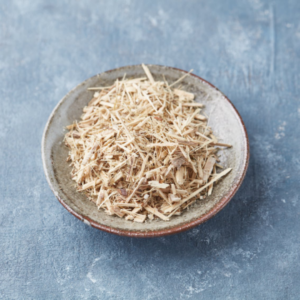 Siberian ginseng (Eleutherococcus senticosus) commonly found as “eleuthero root” has been commonly used in traditional Korean medicine to strengthen muscle and bone.
Siberian ginseng (Eleutherococcus senticosus) commonly found as “eleuthero root” has been commonly used in traditional Korean medicine to strengthen muscle and bone.
Immune benefit: It reduces inflammation and boosting the immune system, and enhances physical performance (23).
Hormone benefit:..


